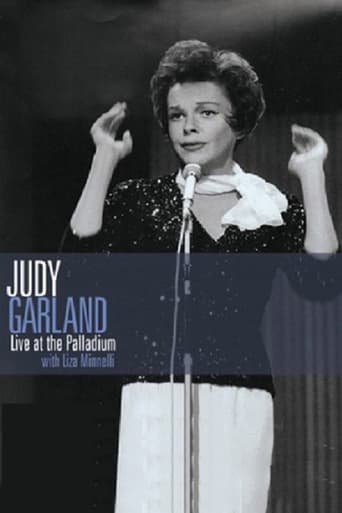SparkMore
n my opinion it was a great movie with some interesting elements, even though having some plot holes and the ending probably was just too messy and crammed together, but still fun to watch and not your casual movie that is similar to all other ones.
ThedevilChoose
When a movie has you begging for it to end not even half way through it's pure crap. We've all seen this movie and this characters millions of times, nothing new in it. Don't waste your time.
Taraparain
Tells a fascinating and unsettling true story, and does so well, without pretending to have all the answers.
Nicole
I enjoyed watching this film and would recommend other to give it a try , (as I am) but this movie, although enjoyable to watch due to the better than average acting fails to add anything new to its storyline that is all too familiar to these types of movies.
mark.waltz
The party wasn't quite over for Judy Garland in 1964, even though she had just finished a one season TV series that should have gone on, and had two movies that wrapped up her film career. Having made a splash Off Broadway, Liza Minnelli was about to go onto Broadway and become the youngest Tony Winner up to that point. This is the type of magical get-together that only comes "Once in a Lifetime" (Judy's opening number), and being "Just in Time", is a historical look at a mother and daughter who were no Mama Rose or Gypsy Rose Lee, but filled with enormous drive and talent and charm and stage appeal that is rarely found today.Of course, Judy had been performing live for 40 years, having made her stage debut in vaudeville at 2, and she didn't push her oldest daughter, Liza, into show business, wanting her to have the normal childhood she was unable to have. Liza, however, had the determination to become a performer, falling in love with the stage, and even though she would go onto win an Oscar, found her niche as a live performer, something Judy would focus on in her last two decades. Judy starts off by singing two songs before introducing Liza, and putting her "Best Foot Forward", Liza makes an instant splash, showing her energy and vitality as an 18 year old, yet mature enough to really bring the audience to their feet as they realized here that the apple didn't fall very far from the tree (ironically the name of a song Liza sang in "The Rink") and that the legacy of talent would continue, even if mother and daughter were two very different people.Judy gets to sing "The Music That Makes Me Dance" which fellow diva Barbra Streisand had just introduced in "Funny Girl", and later Liza and Judy duet with the "Happy Days"/"Get Happy" number that Barbra and Judy had done on Judy's TV show. There's no theft here of material; The way these numbers are performed show the different styles of all three ladies. Certainly Liza and Barbra had the youth, and Judy, being the still moving work horse she was as a performer, became something of a mentor to both. Liza shows the dreamlike quality of her personality, something she attributed to her father, and every moment between mother and daughter becomes a triumphant reminder of the bond between a loving parent and their child, and a tribute to the legacy that Liza to this day tries to retain to keep the respect commanded for both of her parents. With the tragedies in both Judy and Liza's life, it's easy to get emotional over what was yet to be, but when you focus on the magic, you can't focus on the tragic. The humor of both ladies is triumphant enough to show us that even when the curtain comes down early, what was on stage before that curtain did fall is magic that is rarely sustained today.

